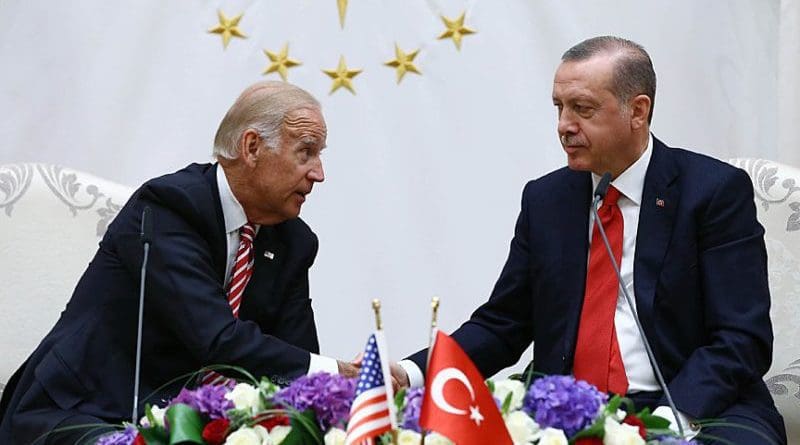Turkey And US Move Closer To Same Wavelength – OpEd
By Arab News
By Yasar Yakis*
The Ukrainian crisis has changed several paradigms in international relations. Turkish-American relations are among them. There was a visible deterioration between these two NATO allies after Joe Biden’s election as US president.
Congressman Frank Pallone, chairman of the House Energy and Commerce Committee, on Feb. 4 sent a letter to the State Department urging the Biden administration not to supply Turkey with F-16 fighter aircraft and modernization kits, due to its human rights violations and the deployment of the Russian-manufactured S-400 air defense system.
Despite cool relations between Biden and Turkish President Recep Tayyip Erdogan, the State Department responded that the potential sale of F-16s to Turkey would serve both US and NATO security interests, particularly in the wake of the Ukrainian crisis.
This change of attitude in the US occurred because of growing awareness about the positive role that Turkey might play in the Ukrainian crisis. Turkey had good relations with both Russia and Ukraine and used this position to host two important meetings with Russia and Ukraine, one in Antalya, the other in Istanbul. It is now trying to do the same between the Russian and Ukrainian presidents.
The Euro-Atlantic community woke up, all of a sudden, to the reality that Turkey might be instrumental in bringing together the two warring sides and contribute to peace in the region. This reality softened the rigid attitude that the EU — and more so, NATO — have displayed toward Turkey in recent years. The first concrete outcome of it is, therefore, the US attitude about the sale of the F-16 fighter aircraft to Turkey.
When Turkey purchased the S-400 air defense system from Russia, both the US administration and Congress reacted harshly, and Congress imposed sanctions on Turkey via the Countering America’s Adversaries Through Sanctions Act. It did not stop there. The US expelled Turkey from the F-35 super-fighter project, which is regarded as the main component of NATO air defense for the next 50 years. About 900 components of the aircraft were being manufactured in Turkish factories.
Ankara did everything to persuade its US counterparts that these sanctions would necessarily weaken Turkey’s defense capability with a direct impact on that of NATO’s. All reasonable explanations by the Turkish military authorities fell on deaf ears on the US side. The Ukrainian crisis helped to change the US attitude, but only on the question of the sale of F-16s. There is still no softening in the US position regarding Turkey’s expulsion from the F-35 project.
On the question of the Russian-manufactured S-400 air defense system, US negotiators unofficially proposed that Turkey make available this air defense system to Ukraine. Turkey rejected this proposal because, at the height of the Syrian crisis, some NATO allies withdrew Patriot missile batteries from Turkey at a time when it badly needed them. Ankara wants to use the S-400 in case of need and does not want to be left again exposed to attacks without proper protection.
Despite the frozen positions on two subjects — the Countering America’s Adversaries Through Sanctions Act and the S-400 air defense system — there is now a timid softening on the subject of the purchase of the F-16 fighter aircraft. Turkey’s demand covers the purchase of 40 F-16s and the upgrading of the existing ones in Turkey’s inventory. In other words, it is a commitment that covers a long period and consolidates Turkey’s relations with the Euro-Atlantic community as a whole. The US will be reassessing the contribution that Turkey may make to this community.
Another critical issue is the impact of US-Russia relations on Turkey’s Syria policy. It is unclear how the new political landscape between the US and Russia will evolve in Syria. The cooperation that the US and Russia used to maintain in Syria has now been suspended. While Russia is so deeply bogged down in the Ukrainian quagmire, it cannot be expected to play the same effective role in Syria.
If the power balance between the US and Russia in Syria tilts toward the US, Turkey will be affected by this new balance in two ways. One way is weakened Russian support for the Bashar Assad regime, and Turkey will be happy about that. However, this support will probably be kept at a level allowing the Syrian regime to float but not sink. Moscow will keep Turkey at arm’s length and avoid unnecessarily antagonizing it.
The second effect of the change in the power balance will be the continuation of the US support for Kurds. Whether the F-16 deal will be sealed or not, the US support for Kurds is likely to continue one way or another.
The Turkish-US negotiations on F-16s look like a breakthrough in the relations between these two NATO allies, but one swallow does not make a summer.
- Yasar Yakis is a former foreign minister of Turkey and founding member of the ruling AK Party. Twitter: @yakis_yasar


Who needs foes with a friend like the USA?